
"Boys (Summertime Love)" is a song by Italian singer Sabrina, released in May 1987 as the third single from her self-titled debut studio album (1987). The song topped the charts in France (where it became the first number-one single by an Italian singer since 1984) and Switzerland, while peaking within the top five in Austria, Belgium, Finland, West Germany, Ireland, the Netherlands, Norway, Spain, and Sweden.
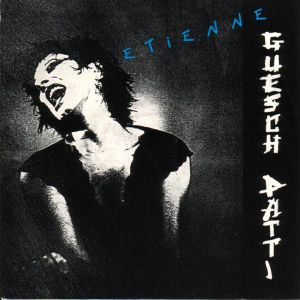
"Étienne" is a 1987 song recorded by French artist Guesch Patti, from her album, Labyrinthe. It was released as her debut single in late 1987 in several European countries. Particularly famous for its suggestive music video which was censored on certain TV channels, the song was a great success in France, Italy, Switzerland, Austria and Germany where it was a top ten hit.

"Bo le lavabo (WC Kiss)" is a 1990 novelty song recorded by the French TV presenter and humorist Lagaf'. It was his debut single and achieved success in France.
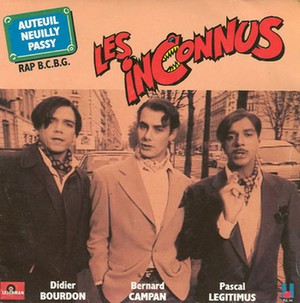
"Auteuil, Neuilly, Passy " is a song recorded by the satiric group Les Inconnus in 1991. Released as a single from their album Bouleversifiant, it achieved great success in France, reaching number one on the national singles chart.

"Le Jerk !" is a 1989 song recorded by French musician Thierry Hazard. It is the first single from his debut album Pop Music and was one of the 1990 summer hits in France. It is also Hazard's signature song, although he has released other successful songs.
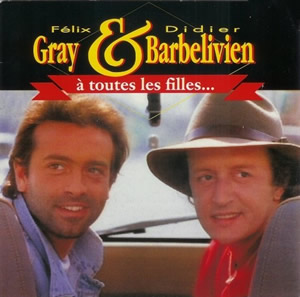
"À toutes les filles..." is a 1990 song recorded as a duet by the French singers Didier Barbelivien and Félix Gray. This ballad was released in May 1990 as the first single from their album Les Amours cassées. It achieved a huge success in France, topping the chart and becoming a very popular song throughout years.
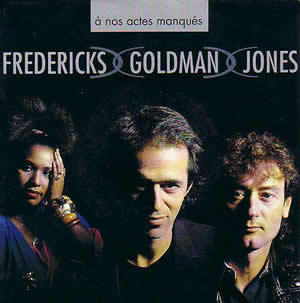
"À nos actes manqués" is a 1991 song recorded by the French trio Jean-Jacques Goldman, Carole Fredericks and Michael Jones. Released as the second single from their eponymous album, the song was one of the summer hits in France and was the trio's most successful single in terms of ranks on the chart. In 2011, M. Pokora covered the song on his album Mise à Jour and released it as a single, which achieved some success in French-speaking countries. The trio also released an English version, To The Deeds We Missed.

"Les Valses de Vienne" is a 1989 song originally recorded by the French artist François Feldman for his 1989 album, Une Présence and was the second singles release from that album in November of the same year. It achieved great success in France, topping the chart for six nonconsecutive weeks, and remains Feldman's signature song and a classic of 1980s French music. It was also included on the singer's three best of compilations: Two Feldman (1996), Best Feldman (1998) and Gold (2008); it was also performed during Feldman's 1991 tour and was thus included on the live album Feldman à Bercy (1992).
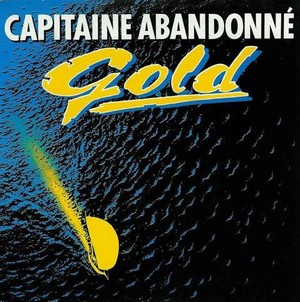
"Capitaine abandonné" is a 1985 song recorded by French band Gold. It was the lead single from the band's second studio album Capitaine abandonné on which it features in an extended version as first track. The song was also available in its main version on the next album Calicoba, released in late 1986. "Capitaine abandonné" was released as Gold's second single overall in January 1986, and met with a success in France where it was a number-one hit.
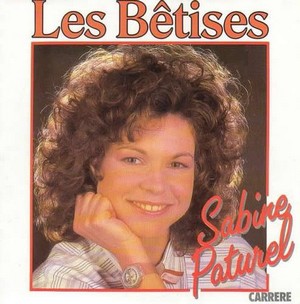
"Les Bêtises" is a 1985 song recorded by French artist Sabine Paturel. Released in March 1986 as her debut single from her album Cœur Bébé, released two years later, on which it is the sixth track. The song was a smash hit in France, though it failed to top the chart. It was covered by several artists throughout the years and became a popular song.

"Qui a le droit..." is a pop song recorded by French artist Patrick Bruel. Written and composed by Gérard Presgurvic and Patrick Bruel, it was the first single from his album Si ce soir..., recorded after his first concerts tour. It was released in a live version in late October 1991 under RCA label and was a hit in France, becoming Bruel's only number-one single.

"Pas toi" is a 1985 song recorded by French singer-songwriter and composer Jean-Jacques Goldman. It was the third and last single of his fourth studio album Non homologué and was released in April 1986. Fully composed by Goldman, it was successful in France.
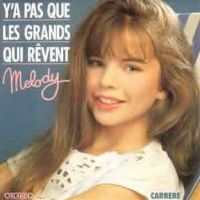
"Y'a pas que les grands qui rêvent" is the a 1989 song by Belgian singer Melody. Written by Guy Carlier and Jean-Pierre Millers, it was released as her debut single in August 1989, when she was 12-years-old. Later, it was included on Melody's debut album, Danse ta vie, released in 1991. It achieved success in France, peaking at number two for one month.
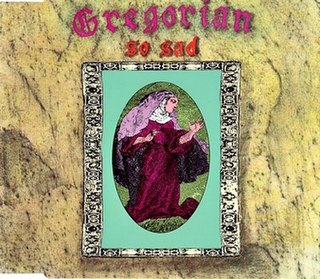
"So Sad" is the debut single recorded by German band Gregorian. It was written and produced by Frank Peterson, and is from the album Sadisfaction (1991), on which it appears as the third track. The song is composed of Gregorian chants using biblical verses while in the chorus a woman is asking Jesus Christ why she is so sad. In the music video, she first enters a church, then becomes a nun. The song was included on Gregorian's best of compilation titled Best of 1990–2010, released in 2011, on which it appears as the first track. It became a hit in France and Portugal.

"Il faut laisser le temps au temps" is a 1990 song recorded as a duet by the French singers Didier Barbelivien and Félix Gray. Written by Barbelivien, while the music was composed by Gray, this ballad was released in November 1990 and became the second single from their 1991 album Les Amours cassées. It hit number one on the single chart in France, and was also a success in the French-speaking part of Belgium.
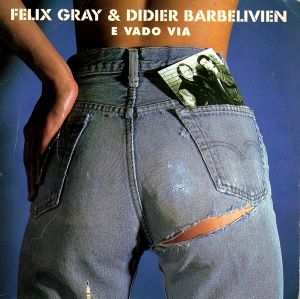
"E vado via" is a 1991 song recorded as a duet by French singers Didier Barbelivien and Félix Gray. Written by Barbelivien with a music composed by Gray, this ballad was released in 1991 and became the third single from their 1991 album Les Amours cassées, on which it is the opening track. Lyrics are in French, except for the chorus which is sung in Italian by a female voice. It was a hit in France, peaking at number five, though it did not reach the same success as the duo's previous two singles.
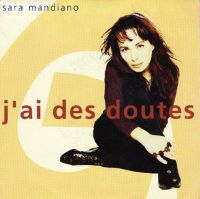
"J'ai des doutes" is a 1991 song recorded by French singer-songwriter Sara Mandiano. Written and composed by Mandiano, it was released in the summer of 1991 as her debut single from her album ? on which it was the second track. It became a top ten hit in France and remained Mandiano's only success on the chart, thus becoming a one hit wonder.

"Déjeuner en paix" is a 1991 pop rock song recorded by Swiss singer Stephan Eicher. Written by Philippe Djian and composed by Eicher, it was released in the middle of 1991 as the lead single from his sixth studio album Engelberg, on which it appears as the fourth track. It became a hit in France and Belgium (Wallonia) and became Eicher's most successful single on the charts.

"Darlin'" is a 1990 soft rock and pop song recorded by Canadian singer Roch Voisine. It was released in January 1991 as the second single from his second studio album Double, on which it appears as the sixth track. It became a top five hit in France and Belgium (Wallonia); in addition, it was nominated for the Félix Award given in Quebec by the ADISQ in the category "Popular song of the year".

"Angelina" is a 1990 song recorded by French band PSY. Written by members Pierre Perez-Vergara, Stéphane Planchon and Yassine Dahbi, this pop song was released in 1991 as the first single from the band's album Être ange, mon ange, produced by Robert Levy-Provençal and which provided the singles "Mahler de malheur" and "Animal moi" too. Directed by Frédéric Planchon, the music video for "Angelina" shows a model named Maïwenn, also known as Polisse. In France, it was a top ten hit and became PSY's only charting single in the country, making the band a one-hit wonder.




















